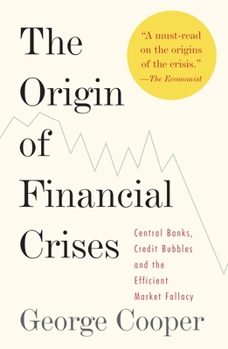The Origin of Financial Crises: Central Banks, Credit Bubbles, and the Efficient Market Fallacy
Select Format
Select Condition 
Book Overview
In a series of disarmingly simple arguments financial market analyst George Cooper challenges the core principles of today's economic orthodoxy and explains how we have created an economy that is inherently unstable and crisis prone. With great skill, he examines the very foundations of today's economic philosophy and adds a compelling analysis of the forces behind economic crisis. His goal is nothing less than preventing the seemingly endless procession of damaging boom-bust cycles, unsustainable economic bubbles, crippling credit crunches, and debilitating inflation. His direct, conscientious, and honest approach will captivate any reader and is an invaluable aid in understanding today's economy.
Format:Paperback
Language:English
ISBN:0307473457
ISBN13:9780307473455
Release Date:October 2008
Publisher:Knopf Doubleday Publishing Group
Length:208 Pages
Weight:0.55 lbs.
Dimensions:0.6" x 5.1" x 8.0"
Related Subjects
Banks & Banking Business Business & Investing Economics Industries & Professions TheoryCustomer Reviews
5 ratings
A different perspective
Published by Thriftbooks.com User , 15 years ago
Perhaps I don't agree with everything the author says in the book, but it is written well, easy to understand, and offers a different perspective from what we often hear on TV or read in the newspapers. At a minimum, it makes one think about various issues that affect all of our lives, and for that I give it 5 stars.
Clear, Concise, Accessilbe.
Published by Thriftbooks.com User , 16 years ago
Excellent overview of the credit cycle. Some reviewers complained about the lack of statistical rigor, but I found that to be the book's greatest strength. There are plenty of econ books that provide a plethora of equations & statistics - if that's what you're looking for, look elsewhere. Cooper sets out to provide a logical analysis of the credit boom/bust cycle that is accessible to a broad audience and succeeds exceedingly well.
A sit-up-and-take-notice book on the economy
Published by Thriftbooks.com User , 16 years ago
The recent financial crisis has produced a rash of books that all claim to provide some insight to our current dilemma. Cooper's book The Origin of Financial Crises first appeared in April 2008 and reprinted in October as the extent of our current crisis became more apparent and more widely publicized. The book provides a brief outline of the history of money and the banking system. This introduction shows readers how the various pieces of our modern economic system came into being, and the reasons that precipitated their creation. One conclusion is that moving away from the gold standard and having a central bank are essential for our economic system to function. Next, the book simply and easily dismantles the Efficient Market Hypothesis (EMH). The arguments expose the theoretical flaws of EMH and the empirical evidence that suggests that financial markets do not behave as EMH would predict them to behave. The book introduces the theories of Keynes and Minsky as alternatives to EMH and shows how these theories better fit the empirical evidence. The authors claim that nfortunately most contemporary institutions charged with stabilizing the economy adhere to EMH. This means that they hold conflicting views, and hence advocate inconsistent economic policies. If the book's goal is to promote refined versions of Keynes' theories, then it does an excellent job. If its goal is to provide an alternative explanation to neoclassical economics, then other "heterodox" theorist need to be considered as well (such as those proposed by Mises or Hayek). To the book's credit, it does cite Ron Paul, and gives credit to Mandelbrot and Fischer. Despite these shortcomings, this book offers the most coherent and down-to-earth skewering of both academic orthodoxy and central bank policy of the books discussing the current financial crisis. The writing style is crisp, the arguments are cogent and well-reasoned, and the examples are clearly and thoughtfully presented for readers with no formal economic background. Despite my criticisms, it is superior to most books about the current financial crisis on the market today. Armchair Interviews says: Important read for people in business or who just want to better understand the economy.
COOPER HAS WRITTEN A READABLE MASTERPIECE
Published by Thriftbooks.com User , 16 years ago
I completely agree with the positive recommendations of The Economist Magazine and the reviewers. George Cooper has combined a strong technical and practical investment background to produce a modern thoughtful study of how to best manage our complex economy. However, I disagree with Brady on its readability, I feel Cooper opens this subject up to any thoughtful investor {regardless their background) by writing in down-to-earth English. He uses everyday examples, like a baker making and selling bread. His clear understanding of the material and deep sympathy for the reader motivate him to use such everyday examples to completely dispense with mathematical equations. He still maintains the needed precision. I was persuaded that economic crises are inevitable, and enjoyed his ideas on how we might deal with them. I want to encourage every investor and student who is curous about how we can improve our economy to read Cooper's clear, cogent presentation.
timing could not be better
Published by Thriftbooks.com User , 16 years ago
Superb read and we all somehow always knew that our growth models cannot work forever. Just loved it - as hard as it was not to put it away in between and run to sell some stock.





